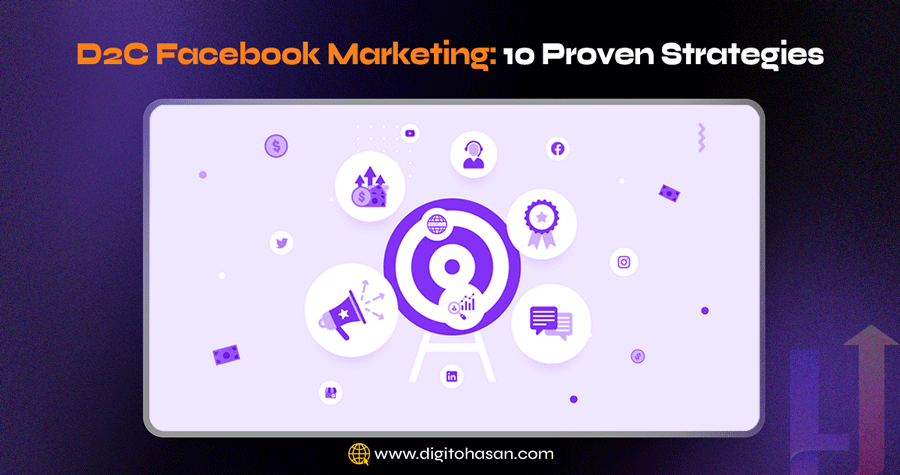1. Set Crystal-Clear Goals for Your D2C Facebook Strategy
Before diving into Facebook marketing, D2C brands need specific, measurable goals. Instead of vague aspirations like “more sales,” set concrete targets. For example, a D2C sustainable clothing brand, “EcoThreads,” might aim to increase online sales by 20% in the next quarter specifically through Facebook-driven traffic and conversions. Clearly defined goals provide direction and allow for accurate measurement of success.
2. Dive Deep into Data with Facebook Insights
Facebook’s Audience Insights is a goldmine for D2C brands. It provides granular data on demographics, interests, purchase behaviors, and even lifestyle choices of your target audience. A D2C skincare brand, “GlowSkin,” could use these insights to identify their ideal customer’s age, skincare concerns, and preferred online shopping habits, enabling highly targeted ad campaigns and content creation.
3. Know Your D2C Customer Intimately
Understanding your target customer is paramount for D2C success. What are their values, aspirations, and pain points? A D2C brand selling ergonomic office furniture, “ComfortCraft,” might target remote workers concerned about back pain and productivity. They can then create content addressing these specific needs, resonating deeply with their target audience.
4. Craft a Compelling D2C Facebook Content Strategy
Consistency is crucial for building a loyal following. A well-defined content strategy ensures your Facebook page remains engaging and relevant. A D2C gourmet food brand, “FlavorVerse,” could create a content calendar featuring recipes using their products, behind-the-scenes glimpses of their production process, and customer-submitted photos of their culinary creations. This keeps their audience engaged and fosters a sense of community.
5. Adhere to Smart Social Media Content Rules
The “Rule of Thirds” (listen, engage, lead) and the “80/20 Rule” (80% educational/informative, 20% promotional) are highly relevant for D2C brands. A D2C brand selling pet accessories, “PawsomeGear,” could share informative articles about pet care 80% of the time and showcase their products in the remaining 20%. This builds trust and positions them as a valuable resource, not just a sales platform.
6. Optimize Posting Times for D2C Engagement
Timing is key to maximizing reach. Research suggests weekdays, especially Tuesday-Friday, and specific times are optimal. A D2C jewelry brand, “Sparkle & Stone,” could schedule their posts showcasing new collections for these peak engagement times, maximizing visibility and potential sales.
7. Engage Actively with Your D2C Community
Responding to comments, answering questions, and running polls fosters a strong sense of community. A D2C fitness apparel brand, “ActiveLife,” could engage by hosting live Q&A sessions with fitness experts or running contests encouraging customers to share their workout routines using their products. This builds brand loyalty and encourages user-generated content.
8. Supercharge Growth with Facebook Ads for D2C
Facebook Ads are incredibly powerful for reaching specific demographics and interests. A D2C brand selling sustainable home goods, “EcoLiving,” could use targeted ads to reach environmentally conscious consumers interested in sustainable living and ethical sourcing. Well-crafted ads with compelling visuals and clear calls to action drive traffic to their online store.
9. Leverage Employee Advocacy for D2C Brand Building
Encourage employees to share company updates and engage with your Facebook page. This expands organic reach and adds a personal touch. A D2C tech gadget brand, “InnovateTech,” could encourage employees to share their experiences using the products or highlight key features on their own profiles, creating authentic buzz.
10. Manage Reviews Professionally for D2C Reputation
Online reviews are critical for D2C brands that rely heavily on online reputation. Responding to both positive and negative reviews promptly and professionally is essential. A D2C beauty brand, “BeautyBloom,” should address any negative reviews with empathy and offer solutions, demonstrating their commitment to customer satisfaction and building trust.
By implementing these strategies, D2C e-commerce brands can effectively leverage Facebook to build brand awareness, drive traffic to their online stores, and cultivate lasting customer relationships.




